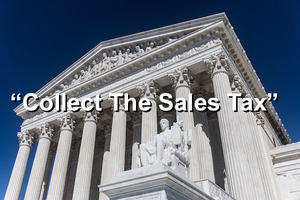- in Uncategorized by Bobby Owsinski
Supreme Court Sales Tax Ruling Might Hurt Music Retailers Instead Of Help Them
 When the U.S. Supreme Court ruled that local sales tax rules could no longer be skirted by online retailers, brick and mortar stores everywhere rejoiced. Finally, a level playing field, everyone thought. Well, not so fast. As always, there may be some unintended consequences involved that actually could do more harm than good to your local music retailer.
When the U.S. Supreme Court ruled that local sales tax rules could no longer be skirted by online retailers, brick and mortar stores everywhere rejoiced. Finally, a level playing field, everyone thought. Well, not so fast. As always, there may be some unintended consequences involved that actually could do more harm than good to your local music retailer.
First of all, way back in 1992 the Court ruled that a mail order company (this was pre-Internet) didn’t have to collect state or local taxes unless it had a physical office in that locality. Every since, this has put every mail order and online retailer at an advantage over their local counterpart in that they didn’t have to collect a sales tax, while the local brick and mortar store did. Buyers would buy online instead of locally if they didn’t have to pay the tax as a result. Now the Supremes have overturned that ruling as “unsound and incorrect” in the face of the new technological world we live in today.
But this ruling is far from cut and dried, however. It basically gives the right to tax mail order or online sales, but it doesn’t tell them how to do it. As a result, it will take some time for each state to sort out how it wants this tax collected before it goes into effect. What’s more, it’s inevitable that each state will have it’s own rules on how this happens, which may mean a logistics nightmare for an online retailer trying to collect a tax that not only is different in ever state, but may also be different in every county as well.
Which brings us to the mom & pop music store. According to Music Trades, every music retailer in their Top 200 Retailer ranking (except for a few high-end piano stores) now has a sizable online business, and most find they need it to survive these days. Will the administrative costs of collecting tax in more than 2,000 different districts across the country force them out of the online business? Will this mean that without the extra income that online sales provide many stores will not survive?
For the large online retailers like Amazon, this isn’t a problem as they already collect taxes in many cases, and the costs of expanding that effort are relatively small. What it does though, is provide another advantage over the local brick and mortar store, which could have large costs involved with collecting and distributing the tax dollars.
It’s easy to cheer a law or Supreme Court ruling when it seems on the surface things are going in your favor, but not many are ever aware of the new and unwelcome problems that might result down the road. This might be one case where everyone in our industry is effected but doesn’t realize it yet.

